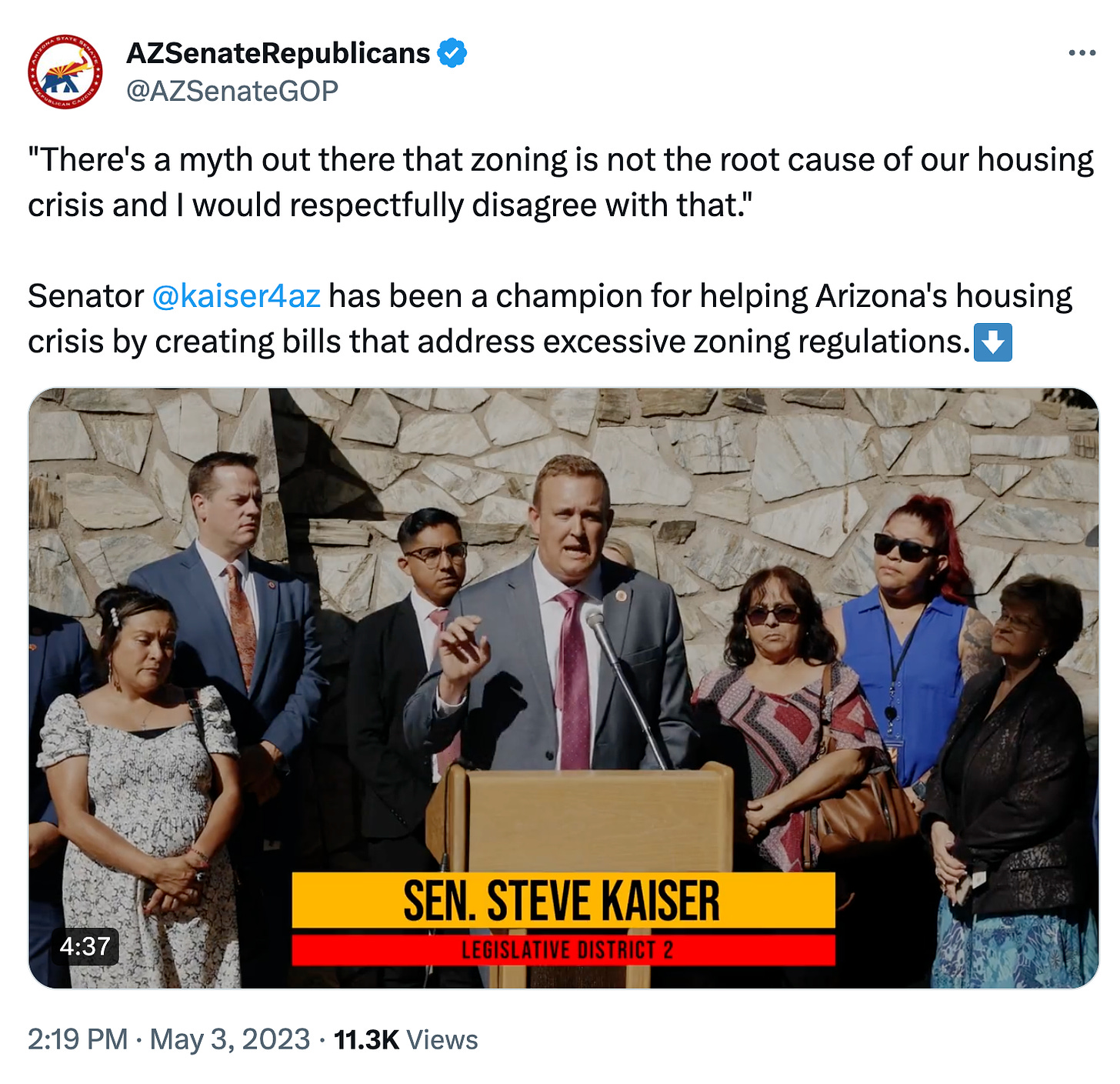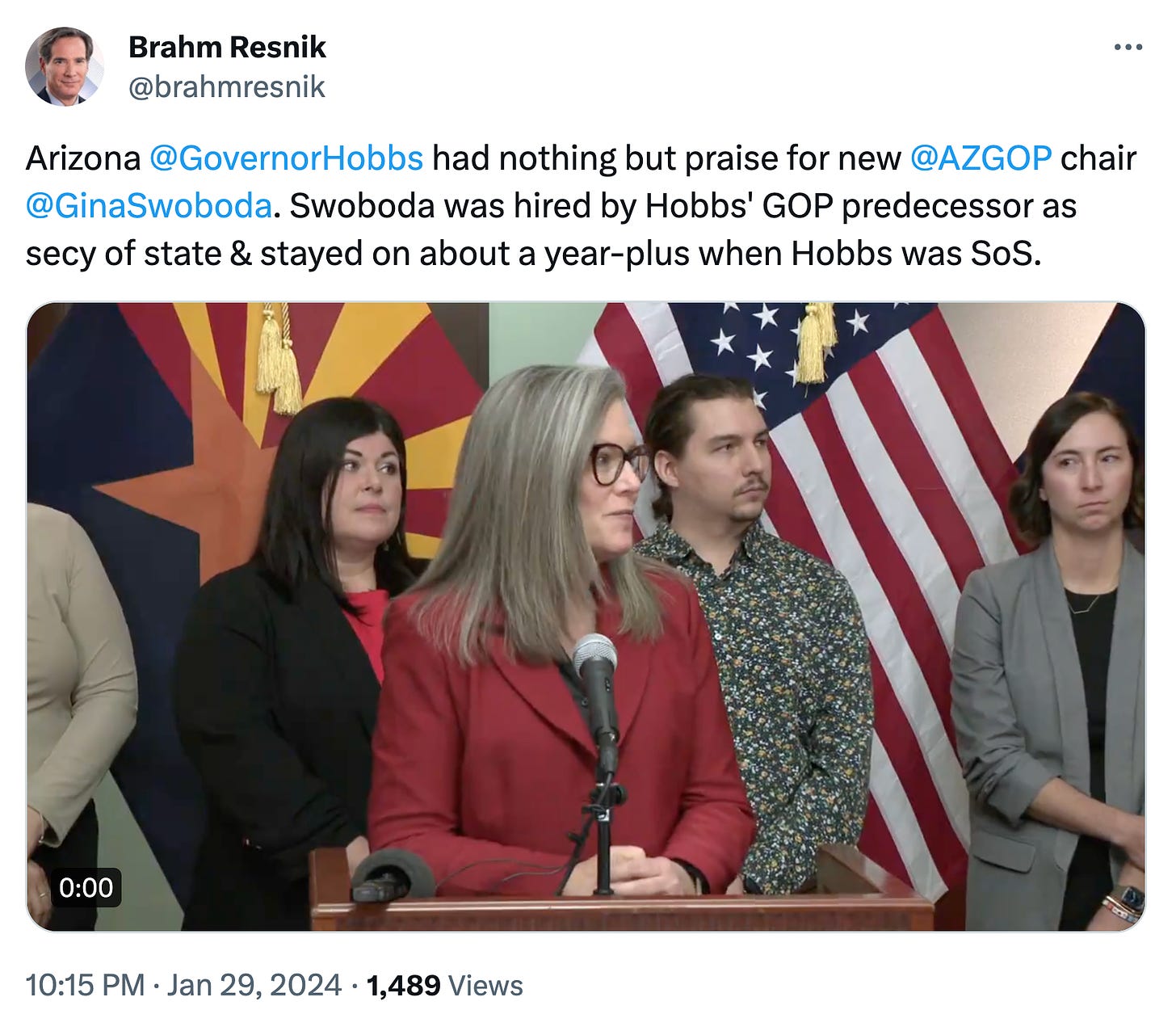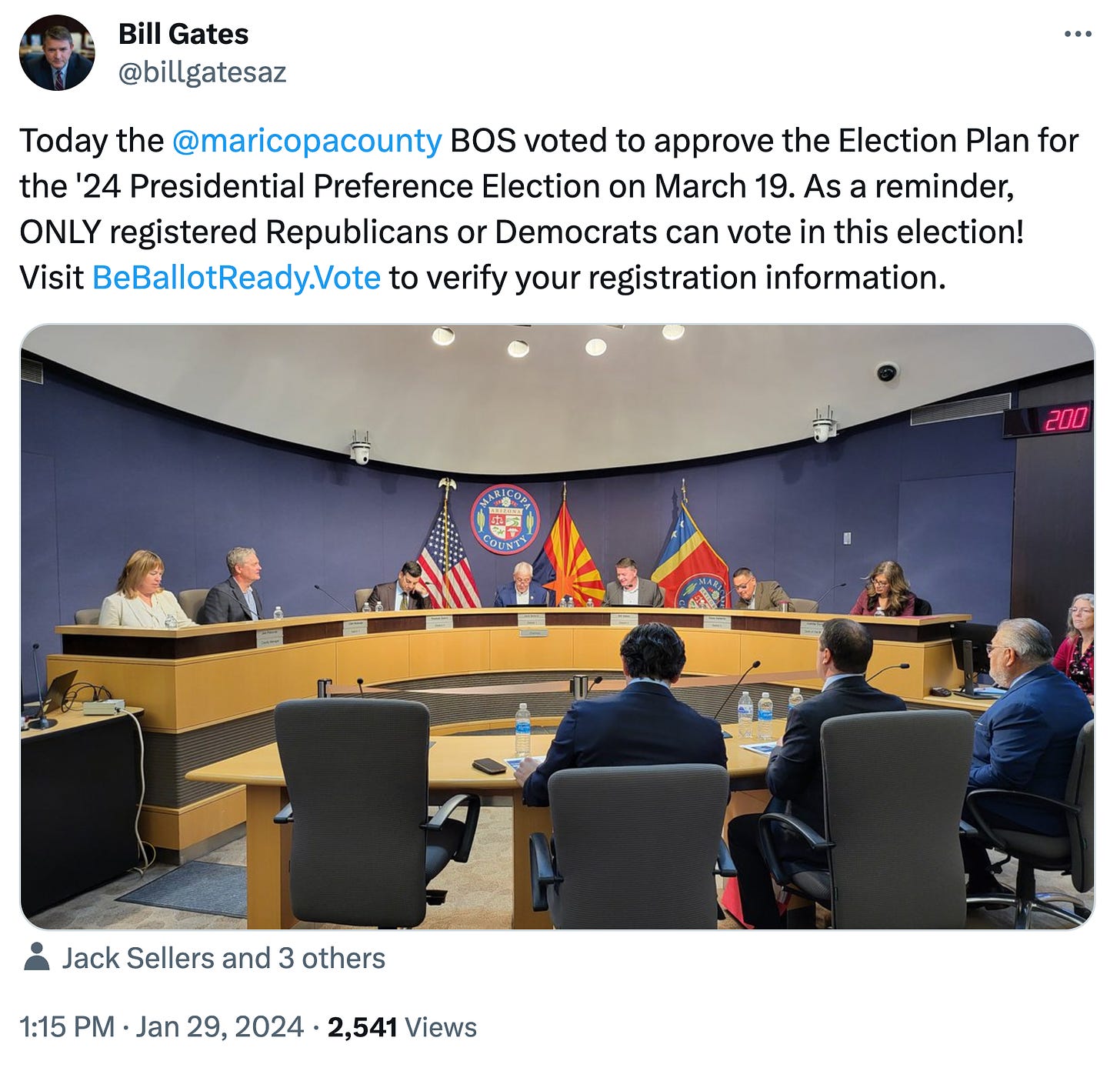The Rent Is Still Too Damn High
We've identified the problem, at least ... We'd like to fly charter, just once ... And click the cats, save the world.
If there’s one universal truth that Arizona’s Democratic and Republican leaders can get behind, it’s that housing in the state is way too expensive.
They just don’t often agree on the cause of the problem, the solution to the problem or whom to blame.
Senate President Warren Petersen says cities and counties are at fault because they’ve increased regulations to such an extent that it's making the timeframes for developers to build housing unrealistic, and stifling the supply side of the supply and demand equation.
“Government has been the problem, particularly local governments,” he said at a press conference announcing Republican’s solution to the housing crisis yesterday.
Many progressive lawmakers and groups blame the state Legislature, saying restrictive policies banning cities from utilizing options like rent control are the real problem.
The issue is predatory developers, and Republicans’ local deregulation measures are just “obfuscating the problem,” Democratic Sen. Juan Mendez said following a separate press conference highlighting progressive grassroots group LUCHA’s legislative priorities, which include repealing the ban on rent control.

For years, Arizona’s housing costs have been spiking as supplies remain woefully inadequate. Last year, lawmakers inched desperately close to passing some reform, but it failed to get enough bipartisan support.
The ideas lawmakers are proposing this year aren’t new — they’re mostly rehashed from last year’s attempts. But this time, Republicans are using a piecemeal approach, breaking up individual ideas from that package to see if some of the smaller bites might be palatable to lawmakers.
Republicans’ solutions embrace the individual’s right to property with as little government interference as possible, and they’re promoting bills that undercut local zoning regulations.
Rep. Matt Gress’ HB2518 would require final zoning decisions within a uniform 180 days and remove the requirements for zoning hearings to be published in newspapers.
Rep. Leo Biasiucci’s HB2297 would require cities to allow commercial buildings to be turned into multifamily housing.
And Biasiucci’s HB2570 would prohibit big municipalities from enforcing codes like minimum or maximum lot sizes, square footage or architectural or aesthetic elements on single-family homes.
Last year’s big push for an “omnibus” housing reform died under the pressure of municipalities and their powerful lobbying organization, the League of Arizona Cities and Towns. It had bipartisan support, but not enough.
Attempts to address Arizona’s housing crisis always come back to one big question — who has control over what gets built? Where are those decisions best made? Is it at the state level, to ensure cities and towns aren’t overly restrictive? Is it the city council, to ensure a community can define itself? Or someplace else entirely?
To the League, the question of how to regulate city zoning should fall to the cities themselves. It promptly responded to yesterday’s city-bashing press conference that the bill proposals “remove resident participation in the development of their neighborhoods.”
Tom Savage, the Legislative Director for the League, said the group can get behind expediting zoning reviews, nixing the newspaper notices and conducting an inventory of statewide housing needs every five years, as Gress’ bill calls for. But the League can’t support the “wholesale deregulation of zoning and land use for residential construction” Savage said Biasiucci’s bills call for.
“Our belief is there's nothing more local than what happens in your neighborhood. And there's no way the state legislature can take in all the considerations for everybody's neighborhoods throughout the state.”
Democratic Rep. Analise Ortiz, who supported Kaiser’s bills last session, said there are many different causes of the housing crisis that fall outside of cities’ and counties’ control, despite Petersen’s blame-casting. But she acknowledged the localities “have played a key role in stifling housing development, which has led us to the crisis we are in today.”
For Ortiz, cutting the red tape of local zoning processes is part of the answer. She’s behind Biasiucci’s HB2570 and hopes it’ll gain bipartisan support.
And she notes there’s a decision-making level even closer to home than your local city council.
“There is no greater local control than the decisions that you make with your family around your kitchen table,” Ortiz said. “And if you decide around your kitchen table that you want to build a house with a carport because you don't necessarily need a garage, then that should be your right as a property owner.”
Spendin’ Sinena: U.S. Sen Kyrsten Sinema has spent $210,000 of her office’s taxpayer-funded budget to charter private airplanes rather than fly commercial, the Daily Beast reports. While it’s not illegal, it’s not something most members of Congress use their limited office budgets on. Democratic U.S. Sen Mark Kelly, for example, has never chartered a private plane, according to records the Daily Beast dug up.
Stop donating to politicians. They’re doing fine. Subscribe to local news organizations instead.
Swobannon: In one of her first official acts as Arizona Republican Party Chair, Gina Swoboda went on Steve Bannon’s War Room show to explain that Kari Lake was booed at the AZGOP meeting because the party is “divided” and one wing didn’t like that Lake sat on the tape. She also didn’t have an optimistic view of the financial state of the party she just took over, saying flatly that there “is no money in the AZGOP.”
“I’m fueled by god… I’m wearing the armor of God. And I think the reason God made me my nerdy election self is for this time,” Swoboda told Bannon.
Senators can be wrong: Gov. Katie Hobbs called a press conference yesterday to pitch her version of Prop 123, former Gov. Doug Ducey’s expiring plan to draw additional dollars out of the state land trust for schools, 12News’ Jolyn Hannah reports. Legislative Republicans also want to extend and renew Prop 123, but at a much lower rate than Hobbs. And since any plan has to go from the Legislature to the voters, Hobbs doesn’t have much say in what’s ultimately approved. But for some fun background on the first Prop 123 fight, check out Stacey Barchenger’s piece in the Republic, which looked back on why Hobbs voted against the plan as a state senator in 2015. Basically, the governor says she was wrong back then.
Finally, a plan: UA Interim Chief Financial Officer John Arnold outlined the school’s plan to handle its $177 million deficit during a special meeting yesterday, the Arizona Daily Star’s Ellie Wolfe reports. The school is facing layoffs and across-the-board cuts of 5% to 15%, according to the report presented to faculty during the meeting. With 75% of the university’s 101 units overspending in fiscal year 2024, each unit has been asked to present plans for operating if 5%, 10% and 15% of their budgets were cut. From there, the UA will decide how much is cut.
More but still too few: More Black Arizonans are running for public office in 2024, from city council to the Legislature, per Republic columnist Greg Moore, who says while the trend is clear, the reasons are varied, from more Black people moving to Arizona generally to better mentoring opportunities for them to get involved in local politics.
What’s another six months?: The effort to incorporate San Tan Valley as a real city hit a snag, and will be delayed by six months, and is now eyeing a May 2025 election date, Axios Phoenix’s Jeremy Duda reports. The delay is basically because the state land department wants to review one plot of land. There have been at least three failed efforts to incorporate the area since 2005.
Big cop scared of little supervisor: A Mohave County man wants $50,000 from the county and the resignation of Supervisor Hildy Angius after she called him her “mortal enemy” for opposing a Pro-Israel resolution at the county board. Greg Befort, is a former cop and a “physically imposing” man, per local reporter Dave Hawkins, asserts that the comments from Angius “threatened and intimidated me.” After their initial interaction, supervisors received anti-Semitic postcards with racial slurs and hate speech, Hawkins previously reported.
Airbnb your big house to pay rent: Navajo County Supervisors enacted new rules allowing property owners to put up pre-fab, 400-square-foot “tiny houses,” per the White Mountain Independent’s Peter Aleshire. But the county didn’t put any ban on turning them into short-term rentals.
Trust them, many trees: Congressional District 1 Democratic hopeful Andrei Cherny’s campaign reached out yesterday to say that while, yes, those 35 million trees that his company claimed it had planted weren’t exactly “planted” at the time, the company really has planted 100 million trees (in the ground as of today). If you don’t know what we’re talking about, you must have missed yesterday’s edition.
AZ murder mystery: Longtime local reporter Christina Estes is releasing her debut novel in March, her publisher announced. “Off the Air” centers on a local TV reporter investigating the suspicious death of a controversial radio talk show host. “It’s an investigation that could make or break her career―if it doesn't break her first,” the preview reads. Get the preorder now.
Yesterday was the final day for state senators to introduce bills for this year’s legislative session.
And introduce bills, they did!
In total, Arizona’s 30 state senators have now introduced 781 pieces of legislation to debate and consider this year.
That’s more than the state’s 60 representatives have filed so far.
But representatives still have some time. Next Monday is the final day for them to introduce any new bills (although after January 11, representatives are only allowed to introduce seven new bills each anyway).
Already we’ve got 1,542 bills, memorials and resolutions introduced this year. But lawmakers will have to pick up the pace if they want to break the record of 1,899 set in 2021.
We don’t pretend to be tech-savvy, but we do know three important facts about the internet:
Cats get clicks
Picture galleries get clicks
And local news organizations need clicks
Well, some smart, enterprising person at the Arizona Republic strung these three facts together and realized they could make a cat picture gallery and get infinite clicks to save local journalism!
Kudos, Republic.
Anyway, please click on this adorable picture of Hank’s cat Juanita to save local news.











God to Swoboda: Please keep my name out of your mouth. Thanks.
I would really like to see some data on the extent to which hedge funds, corporations, landlords, house flippers, and vacation rentals limit housing supply and drive up prices of single family homes and rental properties.
It would also be nice to see a comparison of how much different building codes and zoning regulations add to construction costs compared with similar areas in the country.